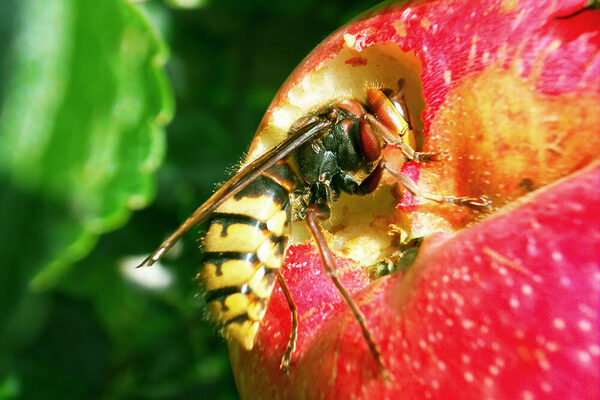Striped insects: No need to panic!
Anyone enjoying time outdoors in summer often comes into contact with bees, bumblebees, wasps and hornets. Many people think they are dangerous - but not all striped insects can sting and they only do so if they feel directly threatened or are defending their nest.
Bees, bumblebees and wasps play an important role in nature as pollinators of flowering plants. Wasps and hornets also eat other insects and pests, making themselves useful as "pest controllers" in the garden and thus supporting the natural cycle. They should therefore be respected and protected in the garden wherever possible.
In late summer, wasps and the like sometimes become a nuisance because they are attracted by cakes, sweet drinks or barbecues.
Nests on the house or in the garden can also become a nuisance because they grow over the summer and the number of inhabitants increases significantly.
A few tips can be implemented to ensure peaceful coexistence:
- Stay calm and do not hit or blow the insects away. Hectic movements and the CO2 in their breath have an alarming effect on the animals, which react aggressively.
- Always cover sweet foods and meat, for example with fly hoods.
- Be careful when drinking lemonade and juice: cover drinks and use a drinking tube.
- Wipe off food and drink residues from the table.
- Lure the animals away from the dining table, for example with a plate of very ripe fruit at a distance.
- Have a spray bottle with water ready: If the insects are sprayed with water, they usually retreat because of the supposed rain.
- Are you planning a garden party? Start a few days beforehand with distraction feeding away from the dining table. Offer the insects ripe fruit there. Wasps learn where a reliable food source is located and will head for it out of habit on the day of your garden party.
- Have you discovered an inhabited wasp nest in late summer? Wasp nests are an annual phenomenon. The inhabitants of the nest die off between the beginning of September and the end of October; the nest will not be colonized again the following year. It is therefore worth considering whether the nest can be left there for the rest of the summer.
"Pest controllers" worth protecting
According to the Federal Nature Conservation Act, all wasps and hornets are protected as wild animals. Removing a nest is therefore only permitted in exceptional cases if there are special reasons for doing so. A special protection status applies to certain species such as the European hornet. The Asian hornet, which until recently was still being combated as an invasive species, is now classified as an established species whose spread can no longer be prevented. Individual specimens or entire nests can still be reported to the Hessian State Agency for Nature Conservation, Environment and Geology, but they are no longer systematically removed.
If wasp nests are to be relocated or removed, the wasp advisory service of the state capital Wiesbaden must be consulted.
Further information
Contact us
Environmental store
Address
65185 Wiesbaden
Postal address
65029 Wiesbaden
Arrival
Notes on public transport
Public transportation: Luisenplatz stop.
Telephone
- +49 611 313600
- +49 611 313957
Opening hours
- Monday, Tuesday, Friday Saturday: 10 a.m. to 2 p.m.
- Wednesday, Thursday: 1 to 6 p.m.
